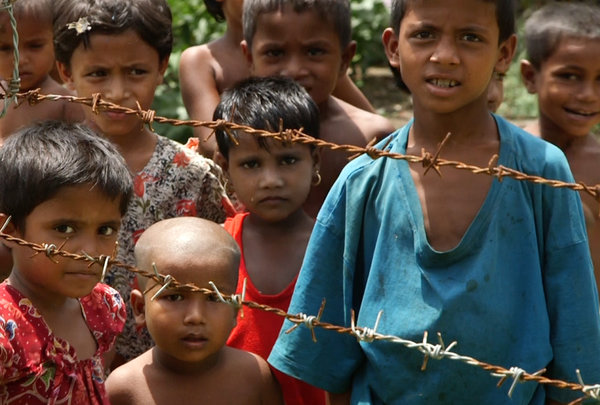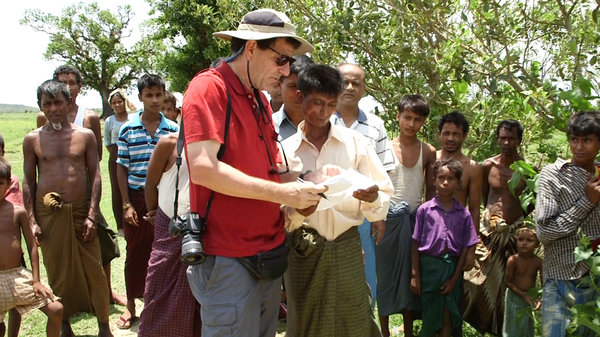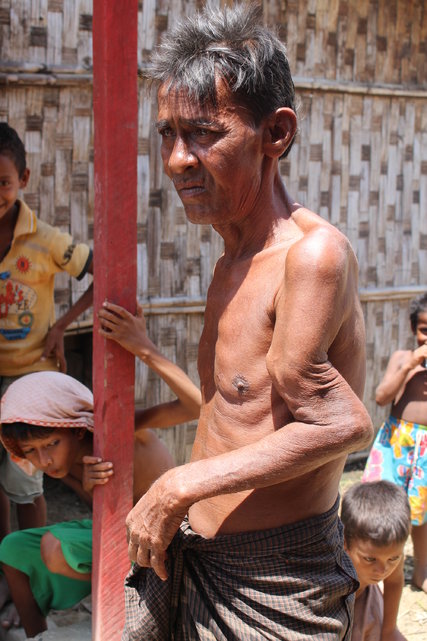Obama Success, or Global Shame?
ASIA--PACIFIC, 9 Jun 2014
Nicholas Kristof – The New York Times
One man, a teacher who spoke a bit of English, thrust a handwritten letter in my hands. Puzzled, I asked him whom he had written the letter for. He explained that he had drafted it in hopes that a foreigner might visit some day and transmit news of the villagers’ suffering.
“Many people are by violent wound died,” the letter recounted in painstaking English. “Now our Rohingyas many people are homeless. We do not have home, food and living very difficulty. Now we are to the cage prison sent.”
The villagers are Rohingya, a dark-skinned Muslim minority that is deeply resented by the Buddhist majority in Myanmar. For decades, Myanmar persecuted the Rohingya and left them stateless, and in the last few months the authorities have amplified the crimes against humanity — yet the global reaction has been largely indifference.

Myanmar, a Buddhist-majority country, keeps many Rohingya Muslims in quasi-concentration camps. Credit Video Frame Grab by Adam Ellick/The New York Times
Since violent clashes in 2012, the Rohingya have been confined to quasi-concentration camps or to their villages, denied ready access to markets, jobs or hospitals. This spring, the authorities expelled the aid group Doctors Without Borders, which had been providing the Rohingya with medical care. Orchestrated violent attacks on the offices of humanitarian organizations drove many aid workers away as well and seemed intended in part to remove foreign witnesses to this ethnic cleansing.
I’m on my annual “win-a-trip” journey, in which I take a university student — this year it’s Nicole Sganga of Notre Dame — on a reporting trip (she’s blogging at nytimes.com/ontheground). We wanted to reach remote villages where Rohingya live, where nobody has much idea what is happening, so we set off by vehicle and then by foot.
What we found is dangerous tension and some malnutrition, but by far the biggest problem is medical care. More than one million Rohingya are getting little if any health care, and some are dying as a result.
In the village of Zeezar, we met a young mother, Saida, 20, whose 10-day-old baby was sickly and losing weight. The baby needed a doctor, but aid workers aren’t allowed in the village, and Rohingya aren’t allowed to leave freely.
In theory, Saida can get a pass to go through checkpoints and visit a clinic. In practice, that sometimes means paying bribes and inevitably means passing the homes of people who have been accused of murdering Rohingya with impunity: For her, it’s terrifying. So she gambled that her baby would recover on her own.

In a remote village in Myanmar where Rohingya live, a teacher who spoke a bit of English gave Nicholas Kristof a letter to share with the world to help explain the suffering of his people. Credit Video Frame Grab by Adam Ellick/The New York Times
In one Rohingya internment camp, we met Thein Maung, 46, who has AIDS and used to get antiretroviral medicines from Doctors Without Borders to keep him alive. Now he has no source of medication, and he feels his health fading.
Another man, Amir Hussein, had his arm broken two years ago by a Buddhist mob. No doctor was available to set the bone, so his left arm now dangles grotesquely and uselessly at an odd angle.
Rohingya children are also denied an education. In one village we visited, parents had set up a free informal school taught by a 17-year-old village girl whose own education had been stalled.
President Obama, in his address a few days ago at the United States Military Academy at West Point, cited Myanmar as one of the administration’s diplomatic successes. It’s true that Myanmar has made tremendous political gains in recent years — the permission I received to report here is testimony to that — and there is much to admire about the country’s progress toward democracy. But let’s not make excuses for a 21st-century apartheid worse even than the system once enforced in South Africa. As Human Rights Watch has documented, what has unfolded here constitutes ethnic cleansing and crimes against humanity.
Likewise, another watchdog group, Fortify Rights, cites internal Myanmar documents and argues that a pattern over the years of killings, torture, rape and other repression amounts to crimes against humanity under international law.

Many Rohingya Muslims are being denied health care. Amir Hussein says his arm was broken by a Buddhist mob two years ago. It is now useless because he never saw a doctor to re-set the bone. Credit Nicholas Kristof/The New York Times
Weighed against such abuses, Obama’s criticisms of Myanmar have been pathetically timid. Because he is hugely admired here, Obama has political capital to pressure the government that he has not used. Indeed, the United States and other countries have often even avoided the word Rohingya, effectively joining in the denial of a people’s identity. That’s a failed policy, for this deference has led Myanmar to tighten the screws on the Rohingya this year.
The Rohingya gave us the names of some Buddhists who they said had been leaders in slaughtering Muslims, and we visited one of these men they named. A 53-year-old farmer, he denied any involvement in the violence, but it was an awkward, tense conversation, partly because the Buddhists are angry at aid groups and journalists for (as they see it) siding with Muslims. Their narrative is that Muslim terrorists from Bangladesh are invading the country, overpopulating so as to marginalize the Buddhists, and then being coddled by foreigners.
The extremists back up this absurd narrative with intimidation. My Buddhist driver, who sported a nationalist tattoo, was willing to take me into Rohingya camps and villages and had no fear of assault by Muslims. But he was terrified of going to some hard-line Buddhist areas, for fear that we would be assaulted as Muslim sympathizers.
When the authorities found out that we were wandering in the hills, they sent a team of police officers armed with automatic weapons to find and “protect” us. They need to start protecting the Rohingya as well.
Look, I’ve seen greater malnutrition and disease over the years — in South Sudan, Niger, Congo, Guinea — but what’s odious about what is happening here is that the suffering is deliberately inflicted as government policy. The authorities are stripping members of one ethnic group of citizenship, then interning them in camps or villages, depriving them of education, refusing them medical care — and even expelling humanitarians who seek to save their lives.
That’s not a tragedy for one obscure ethnic group; it’s an affront to civilization. Please, President Obama, find your voice.
______________________________
Nicholas Kristof, a columnist for The New York Times since 2001, writes op-ed columns that appear twice a week. Mr. Kristof won the Pulitzer Prize two times, in 1990 and 2006. In 2012, he was a Pulitzer finalist in Commentary for his 2011 columns that often focused on the disenfranchised in many parts of the world.
DISCLAIMER: The statements, views and opinions expressed in pieces republished here are solely those of the authors and do not necessarily represent those of TMS. In accordance with title 17 U.S.C. section 107, this material is distributed without profit to those who have expressed a prior interest in receiving the included information for research and educational purposes. TMS has no affiliation whatsoever with the originator of this article nor is TMS endorsed or sponsored by the originator. “GO TO ORIGINAL” links are provided as a convenience to our readers and allow for verification of authenticity. However, as originating pages are often updated by their originating host sites, the versions posted may not match the versions our readers view when clicking the “GO TO ORIGINAL” links. This site contains copyrighted material the use of which has not always been specifically authorized by the copyright owner. We are making such material available in our efforts to advance understanding of environmental, political, human rights, economic, democracy, scientific, and social justice issues, etc. We believe this constitutes a ‘fair use’ of any such copyrighted material as provided for in section 107 of the US Copyright Law. In accordance with Title 17 U.S.C. Section 107, the material on this site is distributed without profit to those who have expressed a prior interest in receiving the included information for research and educational purposes. For more information go to: http://www.law.cornell.edu/uscode/17/107.shtml. If you wish to use copyrighted material from this site for purposes of your own that go beyond ‘fair use’, you must obtain permission from the copyright owner.